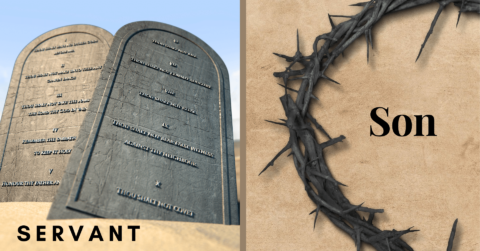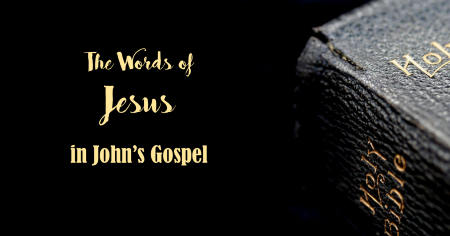Category: Moses
Subject: Moses
Mining the Scriptures: Hebrews 3:1-2

The first 6 verses of Hebrews 3 compare and contrast Jesus with Moses. First, the comparison in verses 1-2.
We begin with identification of Jesus as the Apostle and High priest of our confession. Notice the definite article. He is ‘the’ Apostle — a delegate or ambassador. In these last days, Jesus was the One (the only One) sent to man by God. He is also the only High Priest of the New Covenant, of the order of Melchizedek, (cf. Hebrews 6:20). He is the only high priest needed. “Therefore He is also able to save to the uttermost those who come to God through Him, since He always lives to make intercession for them” (Hebrews 7:25).
Like Moses, Jesus was “faithful to Him who appointed Him” (2). He Himself said, “I can of Myself do nothing. As I hear, I judge; and My judgment is righteous, because I do not seek My own will but the will of the Father who sent Me” (John 5:30). Moses was faithful as well, living his life in service to Jehovah. There are differences between the two, but as stewards, fulfilling God’s desire for them, they were certainly alike in their faithfulness to execute God’s will!
Moses and Jesus – Servant and Son

“Therefore, holy brethren, partakers of the heavenly calling, consider the Apostle and High Priest of our confession, Christ Jesus, 2 who was faithful to Him who appointed Him, as Moses also was faithful in all His house. 3 For this One has been counted worthy of more glory than Moses, inasmuch as He who built the house has more honor than the house. 4 For every house is built by someone, but He who built all things is God. 5 And Moses indeed was faithful in all His house as a servant, for a testimony of those things which would be spoken afterward, 6 but Christ as a Son over His own house, whose house we are if we hold fast the confidence and the rejoicing of the hope firm to the end” (Hebrews 3:1-6).
The book of Hebrews seeks to contrast all that surrounds Christ and His covenant with what came before. In every comparison made, Christ, and all that surrounds His life, ministry, death, covenant and body is better. It is fuller, more powerful, more important, more effective, more sublime.
The reason for this comparison was that Jews who had accepted Jesus as their Christ and Lord were reluctant to move on from the Law of Moses. This was unfortunate, and something that put their standing with God in jeopardy. This the writer made clear: “For on the one hand there is an annulling of the former commandment because of its weakness and unprofitableness, 19 for the law made nothing perfect; on the other hand, there is the bring in of a better hope, through which we draw near to God” (Hebrews 7:18-19).
One of the obvious comparisons would be between Moses and Jesus. Moses was the lawgiver. He would be considered by the Jews as the most important messenger from God. He was given the responsibility of shepherding Israel out of Egyptian bondage, leading them through the wilderness for a generation, and ushering them to the borders of Canaan. In all ways Moses was “faithful in His house” (Hebrews 3:2). Whose house? Not his own. Moses was a servant in the house of God.
The distinction is easy to see. “He who built the house has more honor than the house” (3). There is a great deal of difference between the Master of the house, its owner — and the servant. Jesus Christ is “a Son over His own house” (6) in contrast to the position of faithful servant attributed to Moses.
- Moses was a prophet, Jesus is the Son. “God, who at various ways spoke in time past to the fathers by the prophets, 2 has in these last days spoken to us by His Son” (1:1-2).
- Moses’ covenant was ushered in on the blood of animals, Jesus’ on His own blood. “For it is not possible that the blood of bulls and goats could take away sins” (10:4). “Therefore Jesus also, that He might sanctify the people with His own blood, suffered outside the gate” (13:12).
- No justification was to be found under Moses’ law, it comes through faith in Christ. “Therefore by the deeds of the law no flesh will be justified in His sight, for by the law is the knowledge of sin. 21 But now the righteousness of God apart from the law is revealed, being witnessed by the Law and the Prophets, 22 even the righteousness of God, through faith in Jesus Christ, to all and on all who believe…” (Romans 3:20-22).
- The intent of Moses’ law was to precede “those things which would be spoken afterward” (3:5), but Christ’s law is that which was spoken last (1:2). “But before faith came, we were kept under guard by the law, kept for the faith which would afterward be revealed. 24 Therefore the law was our tutor to bring us to Christ, that we might be justified by faith. 25 But after faith has come, we are no longer under a tutor” (Galatians 3:23-25).
- The Law of Moses ushered in an inferior priesthood to Christ, who is our High Priest after the order of Melchizedek. “But Christ came as High Priest of the good things to come, with the greater and more perfect tabernacle not made with hands, that is, not of this creation. 12 Not with the blood of goats and calves, but with His own blood He entered the Most Holy Place once for all, having obtained eternal redemption. 13 For if the blood of bulls and goats and the ashes of a heifer, sprinkling the unclean, sanctifies for the purifying of the flesh, 14 how much more shall the blood of Christ, who through the eternal Spirit offered Himself without spot to God, cleanse your conscience from dead works to serve the living God?” (Hebrews 9:11-14).
It is disheartening that even in our time religious people do not understand the significance of this contrast. There is a desire to make the appeal to the Law of Moses for authority and standing, not knowing that it abrogates our justification by faith in Christ Jesus. “You have become estranged from Christ, you who attempt to be justified by law; you have fallen from grace.” (Galatians 5:4). There is a difference between Moses and Jesus—The servant and the SON!
Sermon: The Witnesses for Jesus (5:31-47)

Lesson 12 in series (5:31-47)
John the Baptist, God Himself, and Moses all bear witness that Jesus is the Christ, the Son of God.
“Abolished in His flesh the enmity”

The apostle Paul acknowledged the hostility that existed between Jew and Gentile in the first century. He also acknowledged that such enmity was a result of the Law of Moses. This Law placed a barrier between the Jew (the chosen people of God), and the rest of humanity.
That Law was special, even necessary to prepare the world for the Messiah of God. In Galatians 3:24, Paul wrote, “Therefore the law was our tutor to bring us to Christ, that we might be justified by faith.” The Law of Moses was wonderful, but never intended by God to be the means of mankind’s redemption. The promise that God made to Abraham that He would make of his descendants a great nation, was accompanied by the promise that “…in you all the families of the earth shall be blessed” (Genesis 12:3).
This promise was realized when that Law of Moses ceased its authority over men (cf. Romans 7:1-6). When Jesus paid the price for the sins of all mankind, Paul wrote that He, “abolished in His flesh the enmity, that is, the law of commandments contained in ordinances, so as to create in Himself one new man from the two, thus making peace, and that He might reconcile them both to God in one body through the cross, thereby putting to death the enmity” (Ephesians 2:15-16).
We do not mourn the loss of Moses’ law. Instead, we rejoice that it served its purpose, to “bring us to Christ, that we might be justified by faith.” Now, we state with joy, “But after faith has come, we are no longer under a tutor” (Galatians 3:25). “For through Him we both [Jew and Gentile] have access by one Spirit to the Father” (Ephesians 2:18).
To see The Patternists Page on Facebook, click here, and Like!
Sermon: The Law of Moses

The Lesson discusses weaknesses inherent in the Law of Moses. (Not mistakes made by God, but limitations of the law, by design). Also, the Purpose the Law of Moses serves in the redemption of man.
Sermon: Christ and Moses
The Hebrew writer compares Christ to Moses in chapter 3:1-6. The comparison shows that while both were faithful in their duties toward God, Moses was a servant, while Christ is the Son. So, Christ is deserving of far greater glory. The sermon contrasts and compares Jesus to Moses.
Sermon Audio: Click Here .
Podcast: Lessons on Faith from Moses

Podcast Number 36
Moses was a great man of faith. However, on one occasion he exhibited a lack of faith in God, as recorded in Numbers 20:7-12. Even in that failure he teaches us great and important lessons concerning the faith that we have toward God.
To listen to this Podcast, click here .
To subscribe to the podcast feed, click here .




